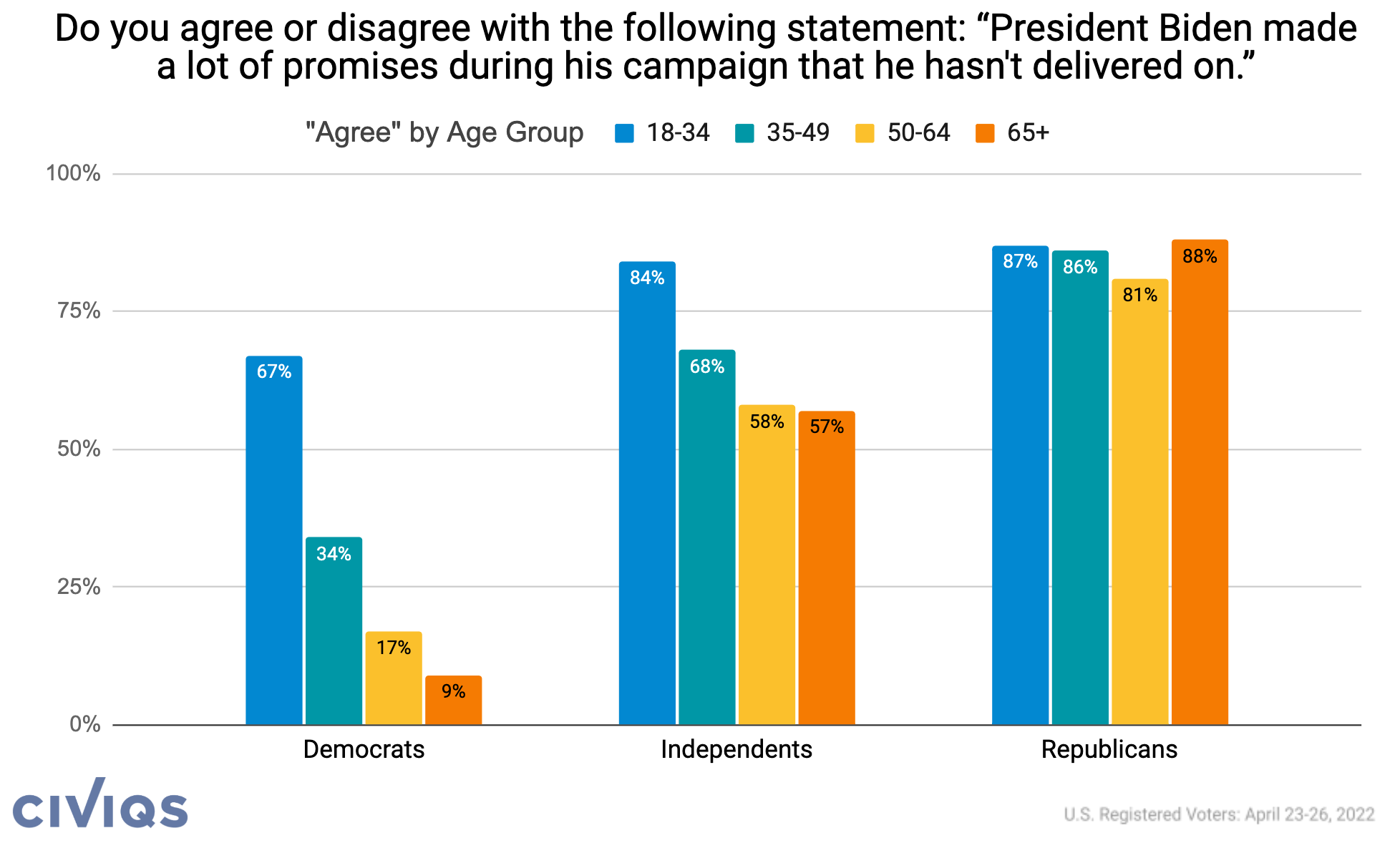Report: Young Democrats Say Biden Hasn’t Delivered on Campaign Promises
The April 2022 Daily Kos/Civiqs Poll asked 1,248 registered voters in the United States about President Biden, transgender Americans, mask mandates, cryptocurrency, and more.
President Biden
Over one year into Joe Biden’s presidency, a majority (60%) of Americans feel that President Biden made a lot of promises during his campaign that he hasn’t delivered on. A substantial number of young Democrats -- who should be among Biden’s strongest supporters -- share this view. Fully two in three (67%) Democrats aged 18-34 say that Biden has not kept his campaign promises, compared to just 9% of Democrats over age 65, and 32% of Democrats overall.

Most young Independents (84%) and Republicans (87%) also believe that Biden has not kept his campaign promises. This is consistent with Civiqs’ daily tracking of Biden’s job approval among Americans aged 18-34, which has fallen significantly since Biden took office in January 2021.
Thinking about President Biden’s time in office, 44% of Democrats expected Biden to do more to help people like them -- including 62% of Democrats aged 18-34. Democrats’ disappointment with President Biden extends to all age groups, with even 33% of Democrats over age 65 saying that they expected more help from the Biden administration.
President Biden’s handling of the Russia-Ukraine war has not improved Americans’ opinions of him. Almost half (47%) think Biden is doing a worse job as president due to his handling of the war, while 33% think he is doing a better job, and 16% have not been affected either way. Biden gets higher marks from Democrats on his approach to the war, but again with a notable age difference. Young Democrats are much more likely than older Democrats to say that Biden’s response to the war has either had no effect on their opinion of him, or has made them think Biden is doing a worse job as president.
Transgender Americans
Americans are deeply polarized over issues involving transgender Americans. Overall, 43% of voters -- and 83% of Democrats -- think that transgender people in the United States are facing discrimination, harassment, and attacks on their rights. In contrast, 41% of voters say that transgender people already have equal rights in the U.S. and are looking for special treatment. This view is shared by 75% of Republicans.
Most voters believe that laws preventing transgender youth from recieving gender-affirming medical care are doing more to hurt than help. Nearly half (48%) of Americans think that this legislation is hurting, while 35% think it is helping. There are substantial partisan differences, as Democrats say by 75 percentage points that this legislation is hurting, while Republicans say by 52 percentage points that it is helping.
Americans feel differently about laws preventing transgender youth from participating on school sports teams that align with their gender identity, as 45% think those laws are helping and 36% think they are hurting. Democrats believe that this legislation is hurting, by a margin of 66% to 10%. Republicans take the exact opposite view and believe, by a 81% to 8% margin, that these laws are helping.
Public Transportation Mask Mandate
The national public transportation Covid-19 mask mandate was lifted by a federal judge earlier this month, against the recommendation of the CDC. Today, about half of Americans (51%) oppose a national mask mandate on public transportation either strongly (43%) or somewhat (8%). The other half (46%) either strongly support (31%) or somewhat support (15%) a transportation mask mandate.
Mask mandates remain a highly partisan issue, as most Democrats (84%) support a national public transportation mask mandate and most Republicans (91%) oppose it. Independents are divided on the issue, with 49% supporting a mandate and 48% opposing it.
Cryptocurrency
Around one in five Americans (21%) say they either currently own cryptocurrency like Bitcoin, Ethereum, Lumens, or Dogecoin (17%), or have owned cryptocurrency in the past (4%). Voters who identify themselves as political independents are most likely to own cryptocurrency. Nearly half of young independents aged 18-34 either own cryptocurrency currently (37%), or have in the past (11%).
Americans are broadly opposed to the U.S. government creating a new digital currency, also known as a “digital dollar." A majority of Americans (56%) oppose the digital dollar proposal, with only 8% of voters in support. There is no clear consensus on whether the U.S. government should do more or do less to regulate cryptocurrency holdings and transactions. Democrats are more supportive of additional regulation, but approximately one in three Democrats, Independents, and Republicans are unsure about the need for more or less government regulation.
_Civiqs surveyed 1,248 registered voters in the United States from April 23-26, 2022. The survey was conducted online, among selected members of the Civiqs research panel. Sampled individuals were emailed by Civiqs and responded using a personalized link to the survey at civiqs.com. The survey results are weighted by age, race, gender, education, party identification, and region to be representative of the population of registered voters in the United States. The general design effect due to weighting is 1.06. The survey has a margin of error of ±2.8% at the 95% confidence level, accounting for the design effect. _
Download the survey methodology and crosstabs
Interested in conducting a survey? Speak with a Civiqs Analyst.
Want Civiqs updates in your inbox? Sign up for our newsletter, Immediate Reaction.